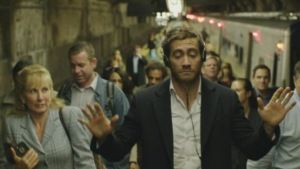Things to do
Jake kills it as an unorthodox southpaw
This article is more than 9 years old.

“Excuse me sir, but if it’s Tivoli o’cock, then it’s a yes please”
The last time we saw Jake Gyllenhaal in cinemas was in Antoine Fuqua’s Southpaw, which also dealt with the grief of a man losing his wife.
Donnie D delivers again
In that film, the protagonist was a boxer who’s life unravelled following his loss and we spent the film watching every painful step he took back to the top. Despite its conventions, that film was eminently watchable, in a large part thanks to Gyllenhaal’s performance – and the same is certainly true here.
Gyllenhaal is not only one of the most interesting artists working in cinema, but he takes admirable risks too, preferring to stay on the fringes of Hollywood. Most recently, Enemy and Prisoners, both collaborations with the Canadian Denis Villeneuve, and Nightcrawler, Dan Gilroy’s searingly brilliant satire of television journalism, have been some of the most compellingly atypical cinema of late. Demolition from Jean Marc Vallée (Dallas Buyers Club) continues that trend.
In grief he became a Luddite
Investment banker Davis loses his wife in a terrible car accident. While all around him, people are falling apart from grief, Davis is unmoved, strangely disconnected from his immediate environment. For much of the film he floats across the screen seemingly unhindered by gravity or reality. He complains to his doctor of a mysterious numbness around his head and chest that he has endured for over a decade.
Immediately following his wife’s death he becomes obsessed by a malfunctioning candy vendor in the hospital and promptly writes a letter to the firm responsible for the machines, demanding a refund, but ends up embellishing the complaint with, amongst other things, an admission that he had never loved his wife. Many more letters follow, leading to a curious relationship with a single mother Karen (Watts), of the firm’s customer services operatives, and her son Chris (Lewis).
Dismantled before our eyes
Demolition describes a man who has allowed himself to become cut off from his own instincts. He’s enabled this with his own passivity as structures were being built around him, such as a house that he hates, a career in his father-in-law’s banking firm that was arranged for him, and a marriage to a woman he never loved.
When we first meet him, it’s pertinent that he’s sitting in the passenger seat while his wife drives. Piece by piece, we see him revisit his life, putting this all together. The titular Demolition comes both literally and metaphysically when Davis develops a penchant for dismantling things – this starts with his refrigerator and evolves into destroying houses with a sledgehammer.
Does it best to demolish itself
Like much of Gyllenhaal’s recent output, Demolition should be credited for finding an unusual approach to its subject. It manages to tell the story of a man dealing with grief without wallowing in the emotions.
Instead the film tackles the mourning process in an intelligent, analytical way that differs greatly from Southpaw, but loses little in humour and heart. There are several touching and funny moments, particularly between Davis and Karen’s teenage son Chris, who himself is undergoing a metamorphosis. As the demolitions progress, Davis finds freedom in honesty. Lies he told, both big and small, to others and himself, are also gradually dismantled.
It’s a shame then that in this fairly sophisticated study, its final moments are rendered awkward, culminating in an unnecessarily feel-good freeze frame (à la Rocky) that seems entirely at odds with the careful work that came before.










































